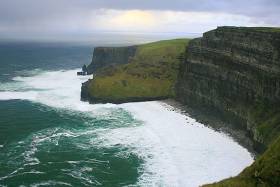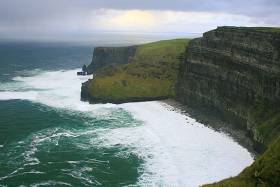Displaying items by tag: BASE Jumping
Tragic Cliff Jumper’s Parachute Opened Wrong Way, Inquest Hears
#CliffsOfMoher - An inquest into the death of a BASE jumper at the Cliffs of Moher earlier this year has heard how his parachute opened in the wrong direction as he was in free fall from the top of the Co Clare beauty spot.
As previously reported on Afloat.ie, the deceased was one of three men who had gone to Aill Na Searrach to perform the jump on the morning of Saturday 22 April.
In his deposition at the inquest, as reported in The Irish Times, Greg McEntee said he completed his own jump and landing safely just before the late Malcolm Rowley leapt from the edge.
McEntee described witnessing Rowley’s free fall and saw him opening his parachute “but when it opened, it didn’t open facing away from the cliffs.”
The incident was a “one in a 100” chance, said the veteran skydiver and BASE jumper of the deceased, whom he noted as having “a reasonable amount” of experience.
BASE (building, antenna, span and earth) jumping is the practice of parachuting from low-altitude fixed objects or cliffs. The extreme sport is considered illegal in most circumstances.
The Irish Times has much more on the story HERE.
Man Dies After Base Jump Gone Wrong At Cliffs Of Moher
#CliffsOfMoher - RTÉ News reports that a man died after a BASE jump went wrong at the Cliffs of Moher yesterday morning (Saturday 22 April).
It’s understood that the deceased, one of three men who had gone to Aill Na Searrach to perform the jump, fell onto rocks at the cliff base when his parachute did not open in time for a safe landing.
Good sea conditions meant the man was promptly recovered by the Irish Coast Guard helicopter Rescue 115, but he was later pronounced dead at Galway University Hospital.
The incident marks the second tragedy at the Cliffs of Moher this month, after a the body of a man seen falling near O’Brien’s Tower was recovered on 9 April, as previously reported on Afloat.ie.
































































